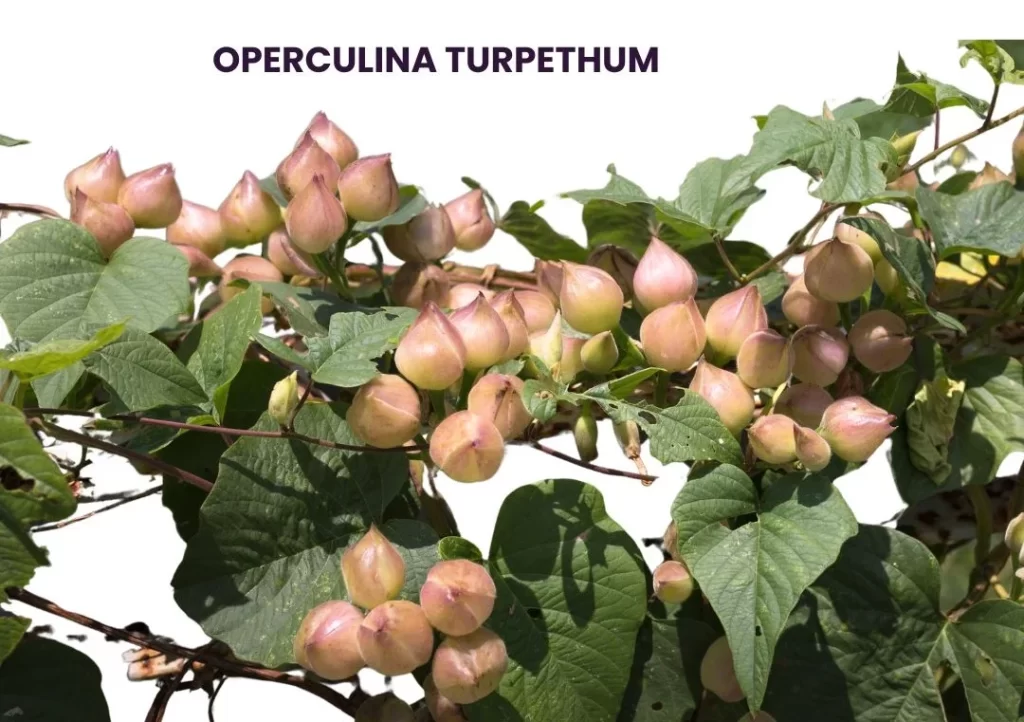Operculina turpethum, commonly known as Nishope, is a homeopathic remedy traditionally used to treat plague, various types of fevers, and diarrhoea.
It acts on the mind, digestive system, and skin, addressing symptoms such as delirium, watery diarrhoea, and skin abscesses.

Table of Contents
ToggleSOURCE INFORMATION
Scientific Classification
- Kingdom: Plantae
- Clade: Angiosperms
- Clade: Eudicots
- Order: Solanales
- Family: Convolvulaceae
- Genus: Operculina
- Species: O. turpethum
Origin
- Operculina turpethum is a plant native to tropical regions, commonly found in India and Southeast Asia.
- It has been used in traditional Ayurvedic medicine for its purgative and anti-inflammatory properties.
Historical Facts
- Historically, this plant has been utilized for its potent laxative effects and for treating various gastrointestinal issues.
- In homeopathy, it is valued for its ability to address more complex conditions like plague and severe fevers.
DRUG PATHOGENESIS
- Operculina turpethum has a pronounced effect on the nervous system, digestive tract, and skin.
- It can cause and cure conditions involving delirium and restlessness, profuse watery diarrhoea, and skin afflictions like boils and abscesses.
DETAILED ORGAN SYMPTOMS
MIND
- Delirium: Severe confusion and agitation, often associated with a fever or infection.
- Restlessness and Loquacity: Excessive talking and inability to stay still, indicating heightened nervous activity.
- Tendency to Escape: Patients may attempt to leave their bed or surroundings, reflecting an altered mental state.
- Ravings and Fainting: Incoherent speech and possible loss of consciousness due to intense pain.
ABDOMEN
- Watery Diarrhoea: Frequent, profuse, liquid stools leading to dehydration and weakness.
- Sinking Sensation: Feeling of emptiness or void in the abdomen, often accompanying severe diarrhoea.
- Cholera Morbus: Acute gastroenteritis marked by severe vomiting, diarrhea, and dehydration.
- Haemorrhoids: Swollen and inflamed veins in the rectum and anus, causing discomfort and bleeding.
SKIN
- Enlarged Lymphatic Glands: Swelling and hardening of glands, typically due to infection or inflammation.
- Boils and Abscesses: Painful, pus-filled lumps on the skin that develop slowly and may take time to heal.
DOSE
- Potency: Typically used in the first to third potency.
Frequently Asked Questions (FAQs)
What conditions can Operculina turpethum treat?
- It is used to treat plague, various fevers, watery diarrhoea, cholera morbus, haemorrhoids, and skin conditions like boils and abscesses.
How does Operculina turpethum affect the mind?
- It can cause delirium, restlessness, excessive talking, and tendencies to escape from bed. Severe pain may lead to fainting.
What are the typical symptoms indicating the need for Operculina turpethum?
- Symptoms include profuse watery diarrhoea, delirium with restlessness, enlarged lymphatic glands, and slow-healing skin abscesses.
Meaning of Difficult Words
- Delirium: A state of severe confusion and rapid changes in brain function.
- Loquacity: Excessive talkativeness.
- Cholera Morbus: An old term for gastrointestinal diseases causing severe vomiting and diarrhea.
- Haemorrhoids: Swollen veins in the lower part of the rectum and anus.
- Lymphatic Glands: Glands that are part of the lymphatic system, helping to fight infections.
- Indurated: Hardened tissue due to inflammation.
- Suppurating: Producing or discharging pus.
